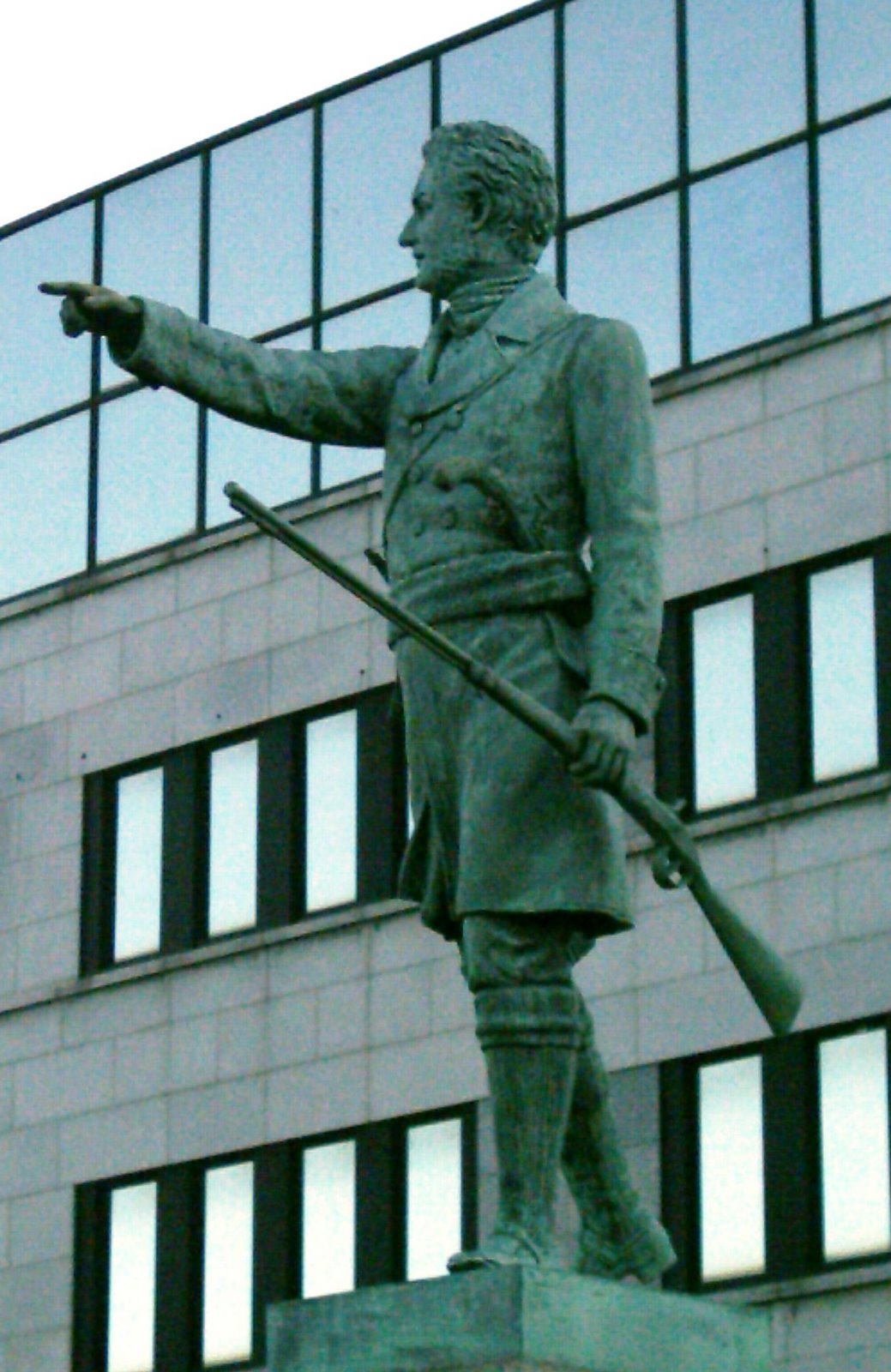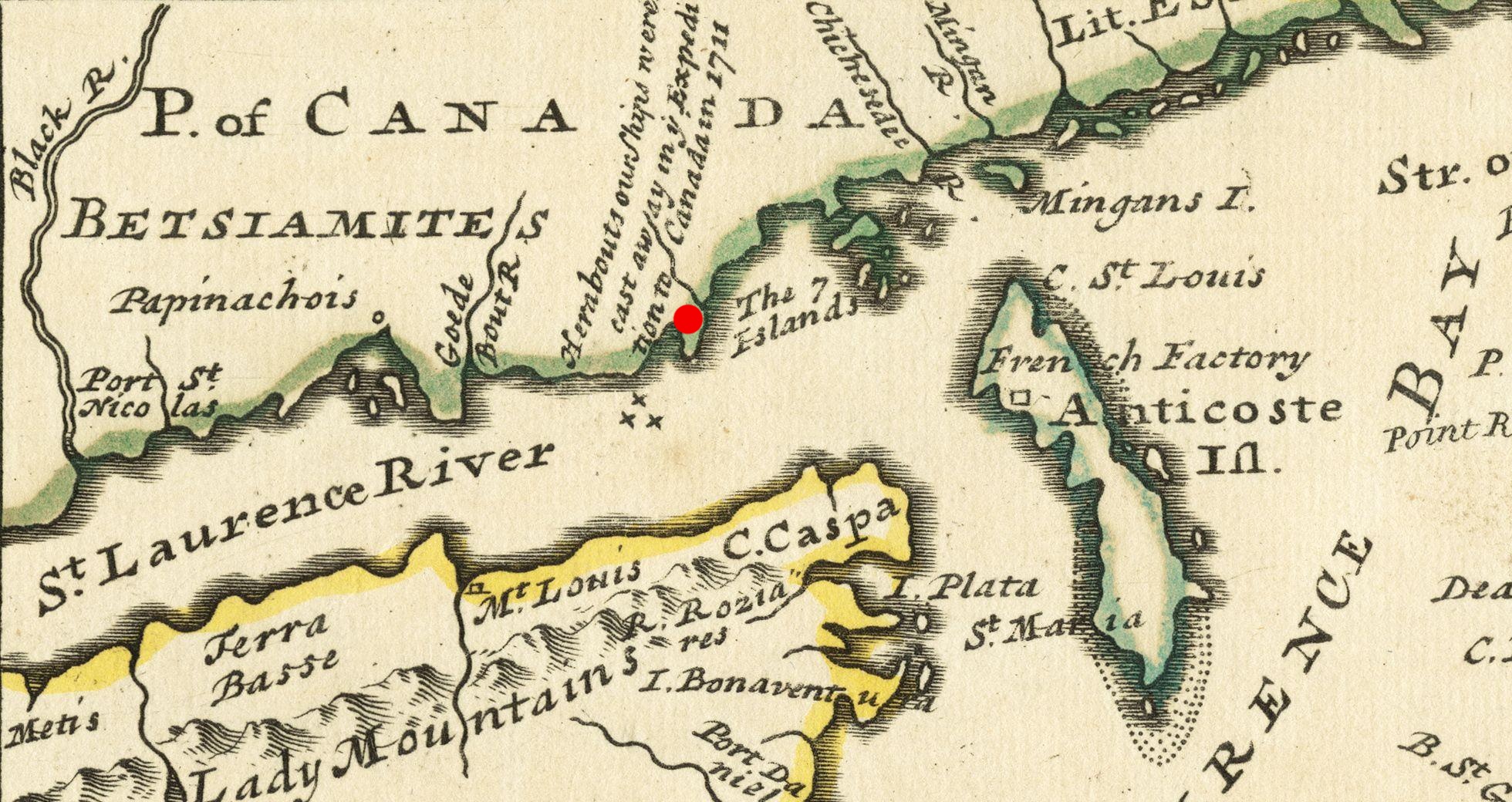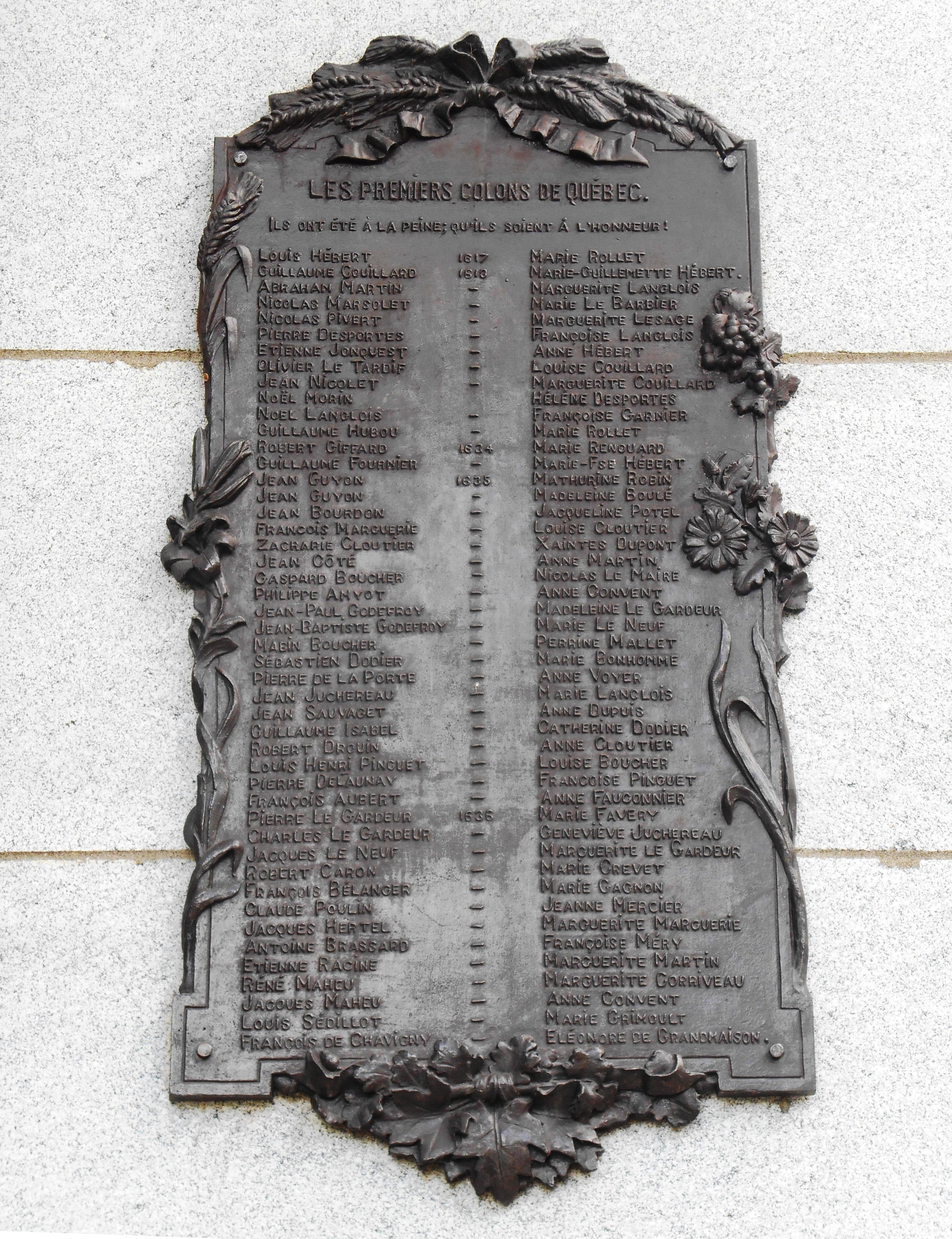|
Jean-Olivier Chénier
Jean-Olivier Chénier (December 9, 1806 – December 14, 1837) was a physician in Lower Canada (present-day Quebec). Born in Lachine (or maybe Montreal). During the Lower Canada Rebellion, he commanded the Patriote forces in the Battle of Saint-Eustache. Trapped with his men in a church by the government troops who set flames to the building, he was shot to death while attempting to escape through a window. He died to shouts of "Remember Weir!", a reference to George Weir, a government spy executed by the Patriotes.'' The Black Book of English Canada'' by Normand Lester, McClelland & Stewart Ltd., Toronto, 2002, p.85. The government forces mutilated Chénier's corpse to intimidate the remaining Patriote supporters: Chénier was excommunicated from the Roman Catholic religion until 1945. The name was condemned because Jean-Olivier Chénier fought on holy ground inside a church. The Chénier park in the Bas-St-Laurent was renamed after the excommunication of the family. The ex ... [...More Info...] [...Related Items...] OR: [Wikipedia] [Google] [Baidu] |
Lower Canada
The Province of Lower Canada () was a British colonization of the Americas, British colony on the lower Saint Lawrence River and the shores of the Gulf of Saint Lawrence established in 1791 and abolished in 1841. It covered the southern portion of the current Province of Quebec and the Labrador region of the current Province of Newfoundland and Labrador (until the Labrador region was transferred to Newfoundland in 1809). Lower Canada consisted of part of the former colony of Canada (New France), Canada of New France, conquered by Great Britain in the Seven Years' War ending in 1763 (also called the French and Indian War in the United States). Other parts of New France conquered by Britain became the Colonies of Nova Scotia, New Brunswick, and Prince Edward Island. The Province of Lower Canada was created by the ''Constitutional Act 1791'' from the partition of the British colony of the Province of Quebec (1763–1791), Province of Quebec (1763–1791) into the Province of Lower C ... [...More Info...] [...Related Items...] OR: [Wikipedia] [Google] [Baidu] |
Pierre Laporte
Pierre Laporte (; 25 February 1921 – 17 October 1970) was a Canadian lawyer, journalist and politician. He was deputy premier of the province of Quebec when he was kidnapped and murdered by members of the Front de libération du Québec (FLQ) during the October Crisis. Life and career Pierre Laporte, grandson of the Liberal politician Alfred Leduc, was born in Montreal, Quebec, on 25 February 1921. He was a journalist with ''Le Devoir'' newspaper from 1945 to 1961, and was known for his crusading work against Quebec's then-Premier Maurice Duplessis. In 1950, he graduated from the Law School at the Université de Montreal, and was hired by ''Le Devoir'' shortly afterwards. During his years in journalism, he published a number of series targeting the management of the Duplessis government. At the same time that he criticized the ''Union Nationale'' government in public, he wrote campaign pamphlets for the ''Union Nationale'' during elections. In 1954, ''Le Devoir'' ran a si ... [...More Info...] [...Related Items...] OR: [Wikipedia] [Google] [Baidu] |
Lower Canada Rebellion People
Lower may refer to: * ''Lower'' (album), 2025 album by Benjamin Booker *Lower (surname) *Lower Township, New Jersey *Lower Receiver (firearms) *Lower Wick Lower Wick is a small hamlet located in the county of Gloucestershire, England. It is situated about five miles south west of Dursley, eighteen miles southwest of Gloucester and fifteen miles northeast of Bristol. Lower Wick is within the civil ... Gloucestershire, England See also * Nizhny {{Disambiguation ... [...More Info...] [...Related Items...] OR: [Wikipedia] [Google] [Baidu] |
People Excommunicated By The Catholic Church
The term "the people" refers to the public or common mass of people of a polity. As such it is a concept of human rights law, international law as well as constitutional law, particularly used for claims of popular sovereignty. In contrast, a people is any plurality of persons considered as a whole. Used in politics and law, the term "a people" refers to the collective or community of an ethnic group or nation. Concepts Legal Chapter One, Article One of the Charter of the United Nations states that "peoples" have the right to self-determination. Though the mere status as peoples and the right to self-determination, as for example in the case of Indigenous peoples (''peoples'', as in all groups of indigenous people, not merely all indigenous persons as in ''indigenous people''), does not automatically provide for independent sovereignty and therefore secession. Indeed, judge Ivor Jennings identified the inherent problems in the right of "peoples" to self-determination, as i ... [...More Info...] [...Related Items...] OR: [Wikipedia] [Google] [Baidu] |
1838 Deaths
Events January–March * January 10 – A fire destroys Lloyd's Coffee House and the Royal Exchange in London. * January 11 – At Morristown, New Jersey, Samuel Morse, Alfred Vail and Leonard Gale give the first public demonstration of Morse's new invention, the telegraph. * January 21 – The first known report about the lowest temperature on Earth is made, indicating in Yakutsk. * January 23 – A 7.5 earthquake strikes the Romanian district of Vrancea causing damage in Moldavia and Wallachia, killing 73 people. * February 6 – Boer explorer Piet Retief and 60 of his men are massacred by King Dingane kaSenzangakhona of the Zulu people, after Retief accepts an invitation to celebrate the signing of a treaty, and his men willingly disarm as a show of good faith. * February 17 – Weenen massacre: Zulu impis massacre about 532 Voortrekkers, Khoikhoi and Basuto around the site of Weenen in South Africa. * February 24 – U.S. Representatives William J. Graves ... [...More Info...] [...Related Items...] OR: [Wikipedia] [Google] [Baidu] |
1806 Births
Events January–March *January 1 ** The French Republican Calendar is abolished. ** The Kingdom of Bavaria is established by Napoleon. *January 5 – The body of British naval leader Horatio Nelson, 1st Viscount Nelson, lies in state in the Painted Hall of Greenwich Hospital, London, prior to his funeral. *January 8 – Battle of Blaauwberg: British infantry force troops of the Batavian Republic in the Dutch Cape Colony to withdraw. *January 9 ** The Dutch commandant of Cape Town surrenders to British forces. On January 10, formal capitulation is signed under the Treaty Tree in Papendorp (modern-day Woodstock). ** Lord Nelson is given a state funeral and interment at St Paul's Cathedral in London, attended by the Prince of Wales. *January 18 – The Dutch Cape Colony capitulates to British forces, the origin of its status as a colony within the British Empire. *January 23 ** Following the death of William Pitt the Younger, his cousin Lord Grenville succeeds him as ... [...More Info...] [...Related Items...] OR: [Wikipedia] [Google] [Baidu] |
Timeline Of Quebec History
This article presents a detailed timeline of Quebec history. Events taking place outside Quebec, for example in English Canada, the United States, Britain or France, may be included when they are considered to have had a significant impact on Quebec's history. * 1533 and before * 1534 to 1607 * 1608 to 1662 * 1663 to 1759 * 1760 to 1773 * 1774 to 1790 * 1791 to 1840 * 1841 to 1866 * 1867 to 1899 * 1900 to 1930 * 1931 to 1959 * 1960 to 1981 * 1982 to present See also * List of Quebec general elections * History of Quebec * History of North America * List of years in Canada * List of Quebecers * Quebec politics * Timeline of Montreal history *New France External linksQuebec History Chronologies1524-2003: From New France to Modern QuebecThe 1837 Rebellions(in French) National Assembly historical data(in French) Chronologie de l'histoire du Québec(in French) (in French) Rond-point : Histoire du Québec(in French) L'influence amérindienne sur la société canadienne d ... [...More Info...] [...Related Items...] OR: [Wikipedia] [Google] [Baidu] |
History Of Quebec
Quebec was first called ''Canada'' between 1534 and 1763. It was the most developed colony of New France as well as New France's centre, responsible for a variety of dependencies (ex. Acadia, Plaisance, Louisiana, and the Pays d'en Haut). Common themes in Quebec's early history as ''Canada'' include the fur trade — because it was the main industry — as well as the exploration of North America, war against the English, and alliances or war with Native American groups. Following the Seven Years' War, Quebec became a British colony in the British Empire. It was first known as the Province of Quebec (1763–1791), then as Lower Canada (1791–1841), and then as Canada East (1841–1867) as a result of the Lower Canada Rebellion. During this period, the inferior socio-economic status of francophones (because anglophones dominated the natural resources and industries of Quebec), the Catholic church, resistance against cultural assimilation, and isolation from non English-spea ... [...More Info...] [...Related Items...] OR: [Wikipedia] [Google] [Baidu] |
Quebec Independence Movement
The Quebec sovereignty movement (French: ''mouvement souverainiste du Québec'', ) is a political movement advocating for Quebec's independence from Canada. Proponents argue that Quebecers form a distinct nation with a unique culture, language, history, and set of values, and thus should exercise their right to self-determination. This principle includes the possibility of choosing between integration with a third state, political association with another state, or full independence, enabling Quebecers to establish a sovereign state with its own constitution. Supporters believe that an independent Quebec would be better positioned to promote its economic, social, environmental, and cultural development. They contend that self-governance would allow Quebec to manage its resources, such as its vast renewable natural assets and strategic geographic location, in alignment with its interests. Additionally, sovereignty would enable Quebec to establish its own fiscal policies, particip ... [...More Info...] [...Related Items...] OR: [Wikipedia] [Google] [Baidu] |
Quebec Nationalism
Quebec nationalism or Québécois nationalism is a feeling and a political doctrine that prioritizes cultural belonging to, the defence of the interests of, and the recognition of the political legitimacy of the Québécois nation. It has been a movement and a central issue in Quebec politics since the beginning of the 19th century. Québécois nationalism has seen several political, ideological and partisan variations and incarnations over the years. Quebec nationalism plays a central role in the political movement for the independence of Quebec from Canada. Several groups and political parties claim to be Québécois nationalists. The autonomist political parties, which do not want the sovereignty of Quebec but the expansion of its powers and the defence of its specificity within Canada, such as the Coalition Avenir Québec, also claim to be Québécois nationalists. Quebec nationalism was first known as "French Canadian nationalism". The term was replaced by "Québécoi ... [...More Info...] [...Related Items...] OR: [Wikipedia] [Google] [Baidu] |





